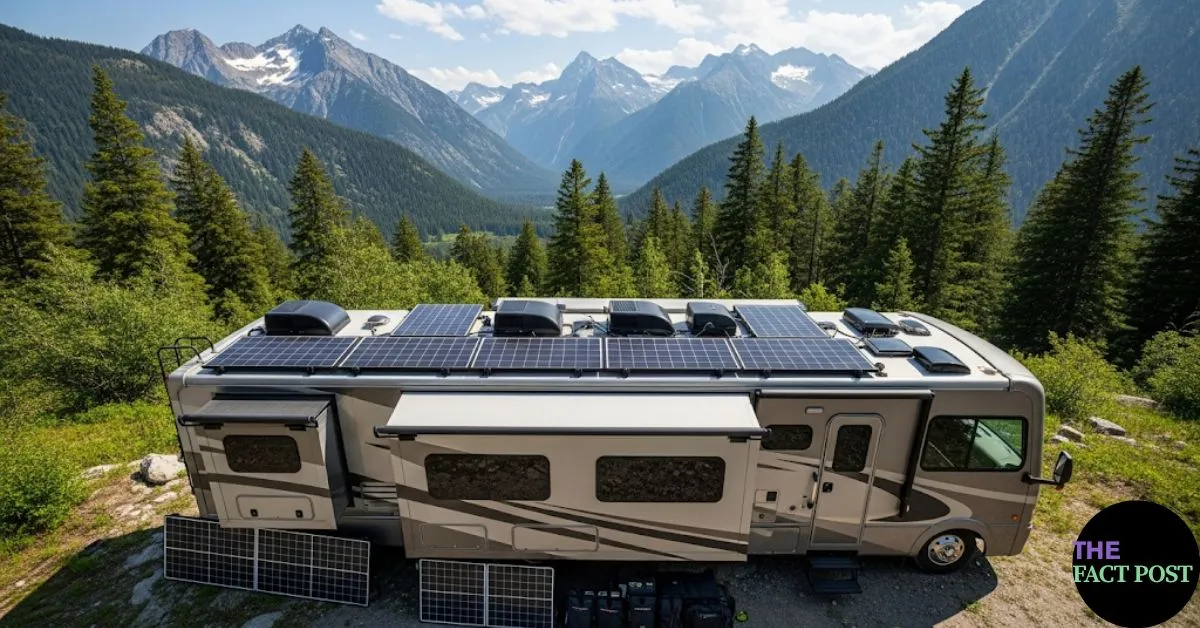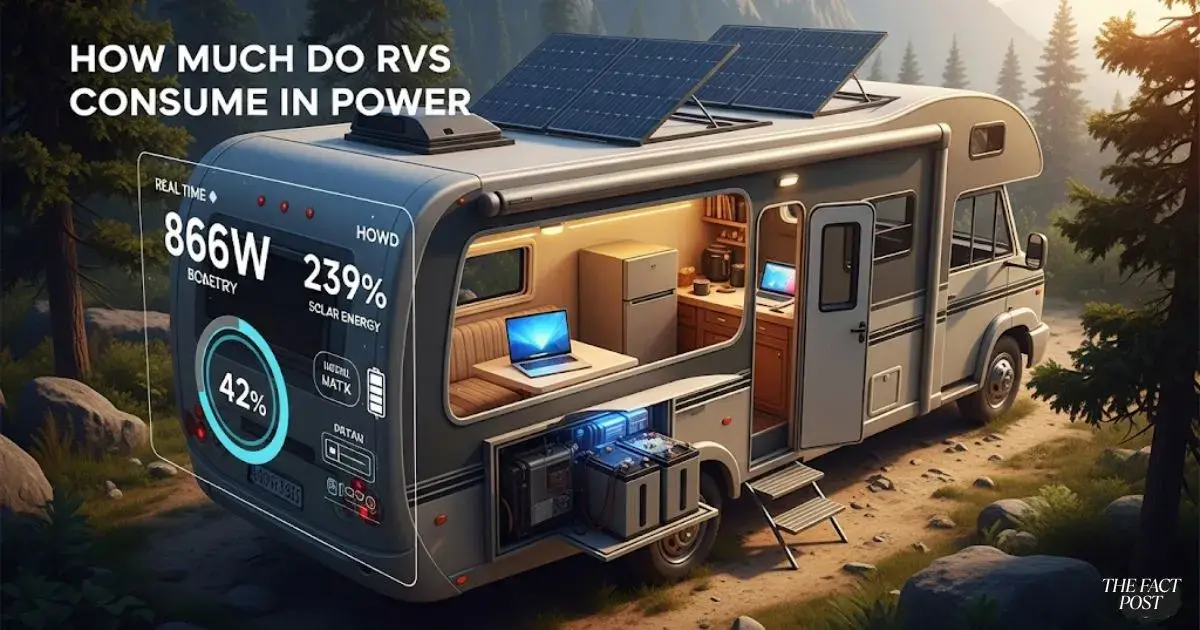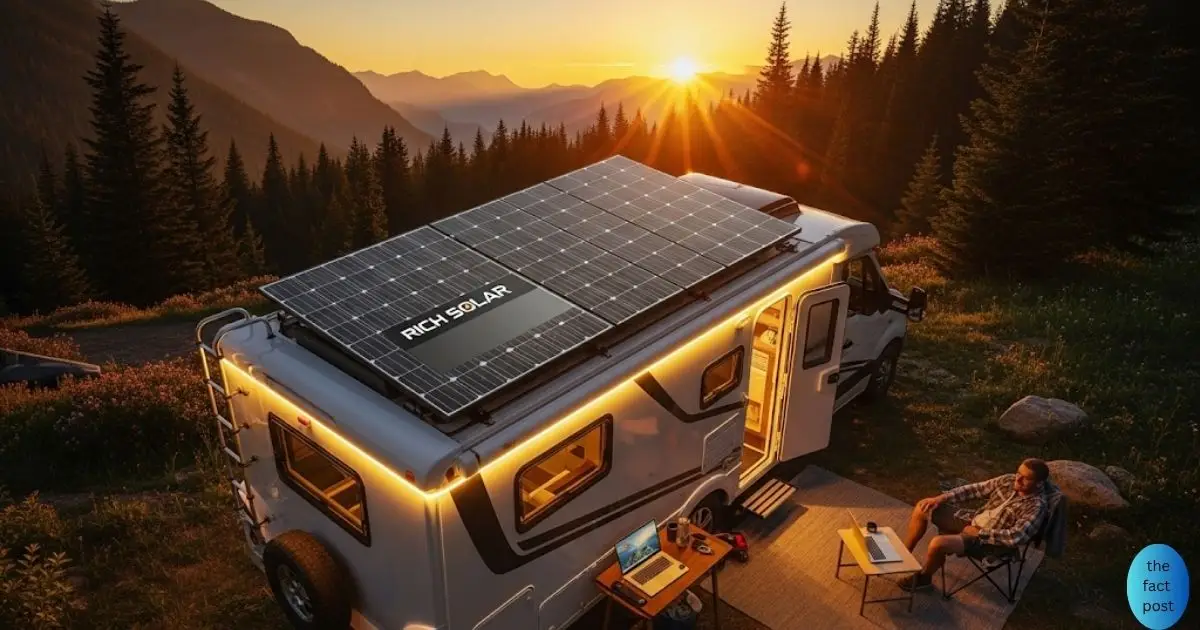The Ultimate Guide to RV Solar Panel Kits: 2025’s Best Solutions for True Off-Grid Power
TOC:
Table of Contents
Introduction
Looking to power your adventures with clean, reliable energy? RV solar panel kits are the ultimate solution for travelers who want true off-grid freedom without relying on noisy generators or campground hookups. Whether you’re a weekend explorer or a full-time RVer, these solar systems provide efficient, eco-friendly electricity to keep your lights on, devices charged, and appliances running.
In this guide, you’ll discover how RV solar works, how to choose the right setup, and which kits lead the market in 2025. Take control of your energy needs—and never worry about running out of power on the road again.
What Are RV Solar Panel Kits? (And Why You Need One)
How RV Solar Kits Work
RV solar panel kits use photovoltaic (PV) panels to convert sunlight into electricity. This electricity is stored in a battery bank and distributed through an inverter to power lights, appliances, and electronics in your RV.
The core components include:
- Solar Panels: Typically monocrystalline for efficiency or polycrystalline for affordability.
- Charge Controller: Regulates voltage and current, prevents overcharging. MPPT controllers are the most efficient.
- Battery Bank: Stores the power for day and night use. Lithium-ion and AGM deep-cycle batteries are most common.
- Inverter: Converts stored DC power into usable AC power for appliances.
✅ Brands like Renogy, Go Power!, and Victron Energy are known for their reliable, all-in-one kits trusted by professionals.
Types of RV Solar Systems
- Fixed Systems: Roof-mounted panels, ideal for full-timers who need consistent energy.
- Portable Systems: Foldable or suitcase-style panels—perfect for shaded parking spots or campers who prefer flexibility.
- Flexible Systems: Lightweight and bendable, excellent for curved roofs or stealth campers like vans.
Why Choose Solar for Your RV?
Installing solar power is more than an energy upgrade—it’s a lifestyle upgrade. Here’s why thousands of RVers are switching to solar:
1. Explore Remote Locations with Energy Independence
With solar, you’re not tied to campground hookups. Boondocking becomes easy and sustainable.
2. Noise-Free Alternative to Generators
Solar systems operate silently, offering peace of mind for you—and your neighbors.
3. Lower Long-Term Energy Costs
While the upfront cost varies, a good solar setup pays for itself in campground fees and fuel savings within 1–2 years.
4. Eco-Friendly and Sustainable
Reduce your carbon footprint by relying on clean, renewable energy instead of fossil-fuel generators.
5. Emergency Backup Power
Keep lights, fans, and critical electronics running—even during breakdowns or grid outages.
How to Choose the Right RV Solar Panel Kit
Choosing the right system depends on your travel style, energy needs, and vehicle type. Here’s how to get it right:
1. Calculate Your Daily Energy Usage
List all devices and estimate their watt-hours per day. A typical RV might need anywhere from 500Wh to 3000Wh/day.
2. Match the Kit to Your Lifestyle
| User Type | Recommended Setup |
|---|---|
| Weekend Camper | 100W–200W, portable kit |
| Seasonal Traveler | 200W–400W, roof-mounted or hybrid |
| Full-Time RVer | 400W–800W+, MPPT charge controller, 2–4 batteries |
3. Consider Battery Storage
Lithium-ion batteries (like Renogy’s 100Ah) are lightweight and long-lasting, while AGM batteries are more affordable but heavier.
4. Look for Expandability
Good kits allow you to add more panels or batteries later. Choose modular systems with MPPT controllers and high input capacity.
Top-Rated RV Solar Panel Kits in 2025
Here are 9 trusted kits used by RVers worldwide, selected for performance, build quality, and real-world reliability:
1. Renogy 400W Monocrystalline Solar RV Kit
Perfect for full-time boondocking. Includes 40A MPPT controller, Bluetooth monitor, and mounting hardware.
2. Go Power! Overlander 200W Solar Charging Kit
One of the most recommended mid-range kits. Built to last, compatible with lithium or AGM batteries.
3. Eco-Worthy 600W Off-Grid Solar Kit
High-output system ideal for large RVs or trailers. Includes inverter, charge controller, and cabling.
4. Zamp Solar 140W Portable Kit
Made in the USA. Plug-and-play solution for beginners. No drilling required.
5. BougeRV 180W Flexible Solar Panel Kit
Lightweight and aerodynamic—great for stealth campers or trailers with limited roof space.
6. HQST 200W Complete Off-Grid Kit
Reliable and affordable starter kit for occasional RV use or small setups.
7. ALLPOWERS 100W Foldable Solar Panel with Battery Bank
Compact and portable—excellent for minimalists or light power use. Built-in USB and DC outputs.
8. ACOPOWER 400W Kit with MPPT Controller
Comes with a high-efficiency controller and optional expansion for heavier loads.
9. Jackery Explorer 1000 + SolarSaga Panels Bundle
Best for hybrid use (RV + camping + emergency). Portable battery station with solar recharge.
Installation Tips & Best Practices
DIY vs Professional Installation
If you’re comfortable with wiring, many kits are DIY-friendly. However, full-time setups or systems with inverters often benefit from professional installation for safety and efficiency.
Roof Mounting Tips
Use corrosion-resistant brackets. Avoid shaded spots (vents, AC units), and always seal cable entry points with weatherproof sealant.
Cable Routing and Weatherproofing
Use UV-protected wires and conduit. Secure all cabling and fuse connections properly.
Safety Tips
- Always disconnect power during installation.
- Wear gloves and eye protection.
- Never mix battery types or sizes.
FAQs About RV Solar Panel Kits
How many solar panels do I need to run an RV?
It depends on usage. A basic system for lights and phone charging may need 100W–200W. To power a fridge, fan, and laptop, 400W–600W is more realistic.
What is the 120% rule for solar panels?
This rule lets you size your solar array up to 120% of your inverter’s rating. It helps maximize power production without overloading your system.
How much are RV solar panels?
Prices range from $150 (small portable panels) to $2,000+ for complete, high-wattage kits with inverters and lithium batteries.
Are RV solar panels worth it?
Yes. Over time, solar saves money on fuel, generator maintenance, and campsite fees. It also adds resale value to your RV.
How many batteries for solar RV?
Most systems use 1–4 batteries. A 100Ah lithium battery stores roughly 1200Wh. Your battery bank size should match your daily usage plus a 20–30% buffer.
What will a 10,000 watt solar system run?
That’s a residential-sized system. In RV terms, you’ll rarely need more than 800–1000W unless you’re running high-demand appliances like AC units or microwaves daily.
Resources & Recommendations
Trusted Brands & Suppliers
- Renogy – High-efficiency kits and lithium batteries
- Go Power! – Rugged, industry-grade RV kits
- Eco-Worthy – Affordable, full-system kits
- BougeRV, Jackery, HQST, Victron Energy – Top-rated niche solutions
Tools to Calculate Your Needs
- Renogy Solar Calculator
- Go Power! Sizing Tool
- VictronConnect App
Helpful Communities
- r/GoSolar
- Escapees RV Club
- iRV2 Solar Forum
- YouTube Channels: Mortons on the Move, RV with Tito
Final Thoughts: Empower Your Journey with Solar Freedom
In 2025, solar isn’t just a luxury—it’s the backbone of modern RV travel. With the right kit, you’ll gain the freedom to explore, the power to stay connected, and the peace of mind that comes with energy independence.
Whether you’re upgrading an old setup or installing solar for the first time, investing in a high-quality RV solar panel kit is one of the smartest decisions you’ll make on the road.
Need a personalized recommendation? Drop your daily watt-hour needs, RV size, and battery type—and I’ll suggest a tailored kit for your setup.





2 comments